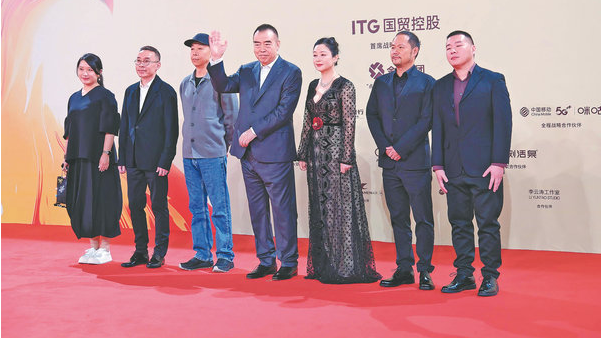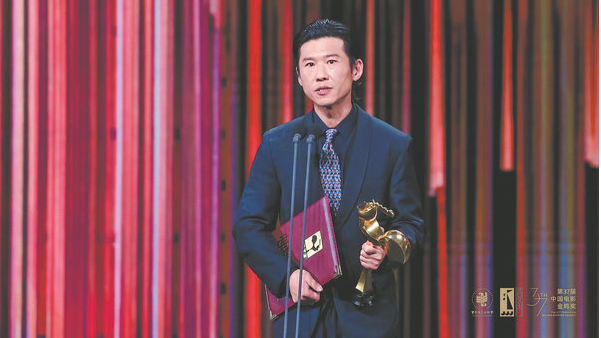The Best Feature Film Award went to Article 20, a film about how prosecutors and ordinary people come together to fight for social justice.
Directed by Zhang Yimou, the film takes its name from Article 20 of the Criminal Law of the People's Republic of China, which focuses on the legal concept of justifiable self-defense. Drawing from such real-life cases, the film explores the conflicts and equilibrium among human nature, morality, and the law. It has captured broad interest, and won praises from the jury for showcasing the country's legal progress.
Lei Jiayin won the Best Actor Award for his role as a prosecutor in the movie. Back in September, also in Xiamen, Lei received the Outstanding Actor Award at the 34th Flying Apsaras Awards for his performance in the TV series A Lifelong Journey.
READ MORE: Hundred Flowers Awards confirms culture is hot ticket
During his acceptance speech for the Best Actor Award, Lei thanked Lyu Xiaohe, a veteran in the film industry who won the Best Actor Award at the fifth Golden Rooster Awards for his role in the movie Wreaths at the Foot of the Mountain (1984).

"When I was 16 and didn't know what to do after graduating from junior high, Lyu asked me if I wanted to learn acting with him. That changed my life," Lei says with emotion.
"At 16, all I knew was that I was a kid who got noticed by a Golden Rooster Best Actor. That's when I first learned about the award."
Li Gengxi, 24, clinched Best Actress for her moving portrayal of Ling Min, a 25-year-old battling severe uremia in Viva La Vida.
The movie narrates the story of Ling and Lyu Tu, a young man suffering from a brain disease, played by 30-year-old actor Peng Yuchang, who was nominated for Best Actor.
The production unit and cast of the film Viva La Vida received a whopping eight nominations, including Best Feature Film, Best Director, Best Scriptwriter, Best Actor, Best Actress and Best Supporting Actress, making it the most nominated film at this year's Golden Rooster Awards.
Chen Kaige secured the Best Director Award for The Volunteers: To the War, the first part of his war trilogy. This marks his second win in this category.
The Best Supporting Actor Award was bestowed upon Wang Xiao for his role in the crime thriller Endless Journey.

Wang says that the award is his first major accolade: "The trophy feels very heavy. This win is a great encouragement to me, my family and my working partners."
Endless Journey follows the story of a former group of police officers who reunite post-incarceration to pursue a murderer who had eluded their capture years earlier.
During an investigation involving a series of escalating crimes, an accidental death of a suspect lands the officers in prison.
Six years later, when the squad's leader Cheng Bing is released, he rallies his former squad members to track the killer across various hardships and locations.
Wang portrays Ma Zhenkun, a squad member who, driven by familial responsibilities, ultimately abandons the pursuit of the culprit.
Wang praises scriptwriter Zhang Ji for crafting a compelling and intricate story.
"When I got the script, each character vividly leapt off the page. Though I've often played police roles before, portraying an officer who becomes downtrodden after an accident is a rarity for me," Wang says.

"In this richly developed role, as an actor, I merely bring it to life. Audiences can see the subtle glimmers of ordinary individuals in the struggle for survival and justice," he adds.
The award for Best Documentary was presented to The Sinking of the Lisbon Maru, a film depicting the courageous rescue of British prisoners of war by Chinese fishermen during World War II.
In October 1942, while transporting approximately 1,800 British POWs from Hong Kong to Japan, the ship was torpedoed by a United States submarine off the coast of China's Zhejiang province.
The prisoners were trapped in the holds and left to perish, with some managing to escape only to be met with gunfire from Japanese soldiers.
Hearing of the tragedy from the shore, Chinese fishermen from nearby Dongji Island rushed to save 384 British soldiers. Tragically, the ship sank, resulting in the loss of 828 POWs who were either shot or drowned.
Inspired by this story, filmmaker Fang Li decided to locate the shipwreck in 2014 and search for survivors and the victim's relatives to share this heroic and heartbreaking story with a wider audience.

After the award ceremony in Xiamen, Fang recounted a touching anecdote from his travels across the United Kingdom while seeking out victims and their families.
In August 2019, when Fang visited the family of a British soldier named John Weaver who perished in the tragedy, Weaver's family members revealed a cherished black-and-white photo of a young Chinese woman from an old fabric wallet.
Inscribed on the back of the photo was the name "Goldy" handwritten by Weaver. Weaver's nieces, Lindsey Archer and Jean Cassidy, had known since childhood about their Chinese aunt named Goldy.
They were aware that she hailed from Xiamen and later moved to Hong Kong, where she met and fell in love with Weaver in 1940 and later married him. After the war, instead of accepting compensation, she left the money to Weaver's family in the UK.
Archer and Cassidy longed to find and meet their aunt.
Following the documentary's release, a search notice was issued in September based on the photo and marriage registration information bearing the name Leung Sou Kam, hoping to locate the woman.

Local media in Xiamen responded actively and within just two days, valuable information was provided. It was discovered that the woman's actual name was Liang Xiujin. In the Minnan (south of Fujian) dialect, "Kam" is equivalent to "Jin", which translates to "gold" in Chinese.
READ MORE: China's Golden Rooster Awards winners announced
"That's why Weaver called her 'Goldy'! It suddenly made sense to me," Fang recalls.
Liang had passed away. Fang then arranged an online meeting on the night of the Mid-Autumn Festival, a festival for Chinese family reunions, to introduce Liang's daughter to Weaver's nieces.
"War destroyed this love story. However, this film has connected the descendants of these two individuals," Fang says. "It's a heartwarming tale from Xiamen."



